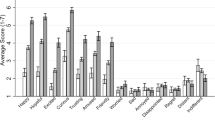Abstract
This paper is based on a study of 576 lottery winners from 12 states. Respondents to a mailed questionnaire included winners of sums ranging from $50,000 to millions. The data indicate that popular myths and stereotypes about winners were inaccurate. Specifically, winners came from various education and employment backgrounds and they were clustered in the higher income categories than the general population indicating that lotteries might not be as regressive as popularly believed. Winners were older than the general population and more often male (60 versus 40%). There was significant association between the amount a person won and his or her work behavior. Individuals with psychologically and financially rewarding jobs continued working regardless of the amount they won, while people who worked in low paying semi-skilled and unskilled jobs were far more likely to quit the labor force. Contrary to popular beliefs, winners did not engage in lavish spending sprees and instead gave large amounts of their winnings to their children and their churches. The most common expenditures were for houses, automobiles and trips. It was found that overall, winners were well-adjusterd, secure and generally happy from the experience.
Similar content being viewed by others
References
Bruskin, R.H.New Jersey Lottery Awareness, Purchase and Attitude Study, prepared for New Jersey State Lottery Commission, January, 1984. (Mimco)
Domhoff, G. William.The higher circles. New York: Vintage Books, 1970.
Gambling in America.Commission on the review of the national policy toward gambling. Washington, D.C.: Government Printing Office, 1976.
Kaplan, H. Roy. (Ed.)American minorities and economic opportunity. Itasca, Ill.: F.E. Pcacock Publishers, Inc., 1977.
—— Lottery Winners:How they won and how winning changed their lives. New York: Harper and Row, Publishers, 1978.
--. “How It Feels to Win a Million Dollars.”McCalls (August, 1978): 161–168.
--. “Survey of Lottery Winners: Final Report,”Loto Canada, February 12, 1979. (Mimeo)
--. “Lottery Winners and Work Commitment: A Behavioral Test of the American Work Ethic.”Journal of the Institute for Socioeconomic Studies, 10 (Summer, 1985): 82–94.
Kohn, Mclvin.Class and conformity. Homewood, Ill.: The Dorsey Press. 1969.
Lundberg, Ferdinand.The rich and the superrich. New York: Bantam Books, 1968.
Mills, C. Wright.The power elite. New York: Oxford University Press, 1959.
Morse, Nancy C. and Robert S. Weiss. “The Function and Meaning of Work and the Job.”American Sociological Review, 20 (April, 1955): 191–198.
Statistical abstract of the United States 1985. Washington, D.C.: U.S.G.P.O.
Weber, Max.The protestant ethic and the spirit of capitalism. New York: Charles Scribner's Sons, 1958, (trans. by Talcott Parsons.).
Weinstein, David & Deitch, Lillian.The impact of legalized gambling: The socioeconomic consequences of lotteries and off-track betting. New York: Praeger, 1974.
Work in America. Prepared under the Auspices of the W.E. Upjohn Institute for Employment Research. Cambridge, Mass.: The MIT Press.
Author information
Authors and Affiliations
Additional information
This study was funded by a grant from the Institute for Socioeconomic Studies in White Plains, New York.
Rights and permissions
About this article
Cite this article
Kaplan, H.R. Lottery winners: The myth and reality. J Gambling Stud 3, 168–178 (1987). https://doi.org/10.1007/BF01367438
Issue Date:
DOI: https://doi.org/10.1007/BF01367438




